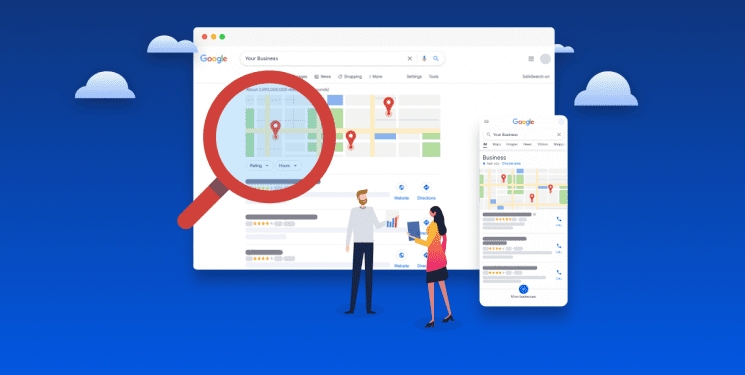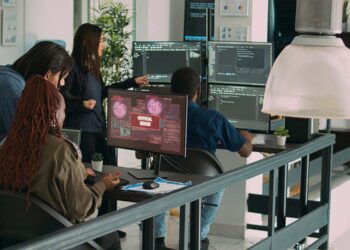The natural referencing (SEO) of a website makes it possible to gain visibility on the search engine results pages. This is an excellent opportunity to publicize a website or a company. The teams of our SEO agency have drawn up 10 criteria to optimize your SEO natural referencing.
Contents
- 1. Adopter le responsive design
- 2. Reduce site loading time
- 3. Optimize your tags and metadata
- 4. Define a keyword strategy
- 5. Create qualitative content
- 6. Optimize Content SEO
- 7. Avoid duplicate content
- 8. Create a powerful net linking
- 9. Be present on social networks
- 10. Utilizer Google Analytics et Google Search Console
- Why optimize your Google SEO?
- You might also enjoy the following articles:
-
ADOPTER LE RESPONSIVE DESIGN
Responsive design, or adaptive website, consists of developing a website that will adapt to the device with which the user connects. This technology responds to new uses: the increase in traffic via mobile devices (tablets, smartphones, connected watches, Smart TVs, etc.) with very different screen sizes. This change in the process of web design makes it possible to display a web page in an optimal way.
The mobile interface adapts to the size of the screen, but also to the ease of navigation (larger and more spaced links, adapted menus, etc.). Responsive web design improves the user experience (UX). Developing this type of website increases traffic via mobile devices and therefore reduces the bounce rate. Responsive design has become the standard: Internet users expect all sites to be responsive!
-
REDUCE SITE LOADING TIME
In addition to a responsive website, you need to think about the loading speed of each web page. Indeed, Internet users have too many choices on the web and do not want to wait to access information or content. In addition, they can browse through a connection with a low speed.
Google penalizes sites that are too slow. A page loaded in 3 seconds or more will lose almost half of the Internet users. This will increase the negative bounce rate and cause you to lose positions on the SERPs of Google, Bing or Yahoo. Since 2010, Google penalizes websites with high loading times: measure the speed of your website with Page Speed.
So how can you improve the loading speed of your site? The number one criterion for limiting waiting and loading is to reduce the weight of the page. You can reduce the overall weight of a page by limiting the code/text ratio, but above all by reducing the weight of the heaviest elements such as photos, visuals, infographics and videos. Use tools like Compressor.io for photos and host your videos with providers like Vimeo or YouTube.
-
OPTIMIZE YOUR TAGS AND METADATA
The Title tag (Title tag) and the Meta Description tag provide a short description of the content of the web page. They have a very strategic role: you have to create the desire to click on your site! Good tags must be consistent with the landing page and your editorial line, include incentive action verbs and finally keywords. They are limited in number of characters: there are online SERP simulators to help you optimize your visibility on search engines.
The other tags on the page h1, h2, h3… hen are chapters of your web pages: placing the vocabulary of the expressions you are targeting in these tags is a good way to improve your positioning on Google. But be careful not to overdo it, the only reading of all your titles must allow the understanding of the content of the page without heavy repetitions.
-
DEFINE A KEYWORD STRATEGY
Keyword research services is one of the most strategic steps in SEO for a website. You must list all the Google queries that Internet users could make in order to come across your website and/or the queries on which you want to position yourself. This corresponds to your activity and you’re positioning in relation to your customers. Are you going to position yourself on “Inexpensive Smartphone Accessories” or “Premium Quality Smartphone Accessories”? Also think of natural queries oriented around questions “which Samsung model to choose?” … There are many keyword research tools like Masen, SEMrush, Yoda Insight, Keywords Planner or even Google Trends.
STRENGTHEN YOUR BRAND POSITIONING
In addition to matching your positioning, you need to know what the competition is on the phrase and also the number of queries. Keywords with low competition (in this case, it is easier to position yourself) or keywords with a high number of requests (significant source of traffic) are to be preferred. This is one of the most important areas of expertise for successful natural referencing. Your keyword strategy will greatly determine the content of your website.
-
CREATE QUALITATIVE CONTENT
The content of a website is one of the most important points. It will attract Internet users, convert Internet users into customers, but also play an essential role in the natural referencing of your site. The robots will crawl your content and the algorithms of Google and other search engines will try to determine what is the subject of your page and process many other criteria, which will allow them to position your website in relation other content available on the internet. The content must be of good quality to participate in the good positioning of your website.
All of the SEO projects within the 1ere Position agency pass through the hands of our experts in web writing and content marketing to increase the quality of your positions in the search engines of course, but also to boost your transformation. The content is with us KING!
-
OPTIMIZE CONTENT SEO
Web writing must satisfy both human Internet users and robots. The use of an adapted lexical field, and significant lexis, and the use of the most important terms must be thought out to provide optimal text content. Be careful, even the algorithms spot spelling and grammar errors as well as excessive optimization (over-optimization or keyword stuffing). These techniques can be hard on search engines, moreover a text written with the intention of “spam” will scare away Internet users.
WRITE ALT TEXT
The text is to date the only element analyzed by the algorithms, as Olivier Andreu puts it so well, “Google is obsessed with text”. Videos and photos must also be worked on to facilitate the work of robots and attract the favors of search engine algorithms. It is necessary to define alternative texts (in particular with the alt attribute for images) to describe each image and allow Google to understand the content of the images. But above all, you have to place the images and videos in the right place, i.e., in a block of text composed of at least a title Hen and a paragraph of explicit text in the semantic field of the content of the video.
-
AVOID DUPLICATE CONTENT
“Just copy/paste the most engaging content from competitors”. Search engines hate this kind of attitude and they severely punish this practice, duplicate content. The web universe exists by the creation every second of new information making the web richer. Creating unique content (text, photos or videos) means being well seen by search engines and making a difference with the competition!
-
CREATE A POWERFUL NETLINKING
Your website must bring new content to the World Wide Web but also fit into the constellation of websites. To be encompassed by other sites, you must set up a net linking strategy. The links between the sites make it possible to regulate web traffic and enrich the browsing experience.
The outgoing links of your site must be contextualized and directed to quality sites with interesting content (thus having a significant thematic trust flow). Backlinks are a great opportunity to optimize your SEO: if other sites designate you with links, it means that you are a reliable site with an interest for readers. Ask your partners to direct links to your site!
Also remember to take care of your internal network, it is just as important. As soon as you can, create links in your content to enhance your different pages related to the theme of the page. It is therefore a question of providing internal links to pages relating to the theme. This internal meshing approach is called “semantic cocoon”.
-
BE PRESENT ON SOCIAL NETWORKS
The web is social! Impossible not to be present on social networks (Facebook, Twitter, Instagram, Pinterest, Snapchat, LinkedIn): they are suitable for all companies and all sectors of activity depending on the targets and objectives to be achieved. You can use some of these social platforms as conduits for your content.
Posting interesting and relevant content can also be a way to spark curiosity. We are talking about Social Media Optimization. Among the people who will discover your content thanks to the RSN, there will sooner or later be someone who will create a link for you on a real site, this will then have a direct impact on your natural referencing.
-
UTILISER GOOGLE ANALYTICS ET GOOGLE SEARCH CONSOLE
Google Analytics is the benchmark for web analytics tools. The web giant offers companies free tools that improve the statistical monitoring of SEO. Google Analytics offers relevant and precise statistics that allow you to understand who your audience is, their behavior, the acquisition of traffic, the conversion rate, but also analyzes on your SEA paid referencing campaign (AdWords, display, etc.).
Google Search Console allows you to improve many criteria and see how Google indexes your website (meta description tags, robots.txt, sitemap, etc.), but also the performance of your positioning on keywords.
However, there are other alternatives to Google, sometimes more efficient, we recommend in particular the Yandex Metrical solutions and the Bing Webmaster tools.
You now have some ideas for improving your natural referencing. It is important to remember that SEO can be combined with paid referencing (or SEA) to gain in efficiency. Do not hesitate to ask our SEO experts for help to talk about your website and boost your visibility.
WHY OPTIMIZE YOUR GOOGLE SEO?
Natural referencing is intimately linked to Google, to the point that we sometimes speak of Google referencing. With more than 90% of searches in almost all the countries of the globe, the American search engine enjoys an undeniable position on the market. In fact, SEOs focus primarily on this search engine to create SEO strategies and implement optimizations. In concrete terms, most of them follow Google’s instructions to webmasters to the letter and aim at all costs for the best possible position on Google.
With nearly 10 algorithm changes per day, Google is a constantly evolving engine. Ask Google SEO experts to support your site and guide you to the best positions!












Discussion about this post